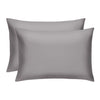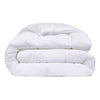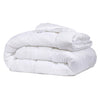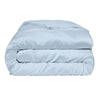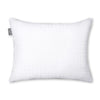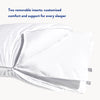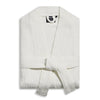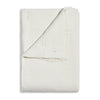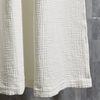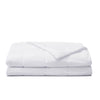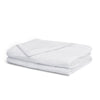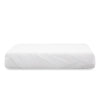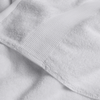The Daily Miracle
Is It Bad To Sleep On A Mattress Without Sheets?
Published
May 22, 2025
Author
John Tsenekos

Have you ever found yourself without clean sheets, just moved into a new place, or started wondering if you really need to use sheets at all? Maybe you’re a student, living a minimalist lifestyle, or just curious about what happens if you sleep directly on your mattress. Is it actually a problem to go without sheets?
In this article, you’ll find out what it means for your hygiene, comfort, mattress care, and sleep quality when you skip the sheets. Whether you’re in a temporary situation or just exploring your options, you’ll get clear answers to help you decide what works best for your sleep and your health.
What Happens When You Sleep Directly on a Mattress?
Sleeping straight on your mattress might seem harmless, but it can have some surprising effects. Here’s what really happens when you skip the sheets.
Hygiene Concerns
When you sleep without sheets, your mattress ends up collecting everything your body naturally sheds, like sweat, skin cells, and oils. Over time, this buildup creates an environment where bacteria and allergens can thrive, severely compromising bed hygiene. Without a protective layer, your mattress can start to develop unpleasant odors and may even become a hotspot for dust mites. Unlike sheets, which you can toss in the wash, mattresses are much harder to clean, so anything that gets on them tends to stick around.
Comfort and Sleep Quality
Mattresses are built for support, not for direct skin contact. Without sheets, you lose that extra layer of softness and comfort on sleeping surfaces that helps regulate your body temperature while you sleep. Sheets are designed to wick away moisture and keep you cool or cozy, depending on the season. Sleeping directly on a mattress can leave you feeling less comfortable and may even disrupt your sleep quality, especially if the mattress fabric feels rough or traps heat.
Mattress Protection and Longevity
Sheets do more than just make your bed look inviting. They act as a barrier that protects your mattress from stains, spills, and everyday wear. When you skip the sheets, any accidental spills or sweat go straight into the mattress, which can lead to permanent stains and even mold over time. This kind of damage can shorten the lifespan of your mattress and lead to costly cleaning or early replacement. Using sheets is a simple way to keep your mattress in better shape for longer, saving you money and hassle down the line.
Is It Bad To Sleep On A Mattress Without Sheets?
Sleeping without sheets can expose you to more bacteria and allergens. Mattresses are much harder to keep clean than sheets. This extra exposure can lead to skin irritation or discomfort, especially if you have sensitive skin or allergies.
Increased Exposure to Bacteria and Allergens
Mattresses collect sweat, skin cells, and oils. These can become a breeding ground for bacteria, dust mites, and allergens. Without sheets, you’re in direct contact with these things every night. This raises your risk for allergic reactions, congestion, and even breathing problems if you’re sensitive to dust or mold.
That’s why it’s smart to always use clean sheets and wash them often. If you want extra protection, try using a mattress protector too.
Higher Risk of Skin Irritation
Sleeping right on a mattress can lead to skin discomfort. This is especially true if you have sensitive skin or eczema. Dust, bacteria, and other particles can cause itchiness or rashes.
Choosing soft, breathable sheets made from cotton or bamboo can help keep your skin comfortable.
Greater Chance of Unpleasant Odors
Sweat and oils can soak into your mattress and cause odors that are hard to remove. Sheets are easy to wash, but mattresses trap smells.
Washing your sheets often and letting your mattress air out can help keep things fresh. A mattress protector can also help stop odors from building up.
Increased Likelihood of Allergic Reactions
If you have allergies or asthma, sleeping without sheets can make symptoms worse. Dust mites and allergens settle into mattresses. Without a protective layer, you’re more likely to sneeze, cough, or have trouble breathing at night.
Using hypoallergenic sheets and pillowcases, washing bedding in hot water, and vacuuming your mattress can help a lot.
More Disrupted Sleep
A mattress without sheets can feel rough or trap heat. This makes it harder to get comfortable and can lead to tossing and turning.
Quality sheets add softness and help keep your temperature just right, so you can sleep better and wake up feeling refreshed.
Verdict
Experts in sleep hygiene recommend always using sheets. Sheets create a washable barrier that supports better health and a better night’s sleep.
What is the Healthiest Material to Sleep In?
When it comes to choosing the healthiest material for your bedding, you want fabrics that are breathable, gentle on skin, and easy to keep clean. Natural fibers like cotton are popular because they allow air to circulate, wick away moisture, and feel soft against your skin.
However, not all cotton sheets are created equal. Higher quality weaves and advanced fabric technologies can make a noticeable difference in your sleep environment.
For those who want to take sleep hygiene to the next level, silver-infused fabrics offer a unique advantage. Silver-infused sheets, like Miracle Made Sheets, are inspired by NASA and designed to prevent up to 99.7% of bacteria growth on your bedding. This means your sheets stay fresher up to three times longer than traditional options, so you can enjoy a cleaner sleep environment with less frequent washing.
Miracle Made® Sheets are crafted to be soft, breathable, and gentle on sensitive skin. The silver infusion helps support cleaner skin and a healthier sleep space, making them an excellent choice if you’re looking for the healthiest bedding material.
Do You Need A Mattress Protector?
A mattress protector isn’t on the list of bedding essentials for everyone, but it can make a big difference in keeping your bed clean and comfortable. Mattress protectors act as a barrier against spills, sweat, and everyday messes that can soak into your mattress. They also help block dust mites and allergens, which is especially helpful if you have allergies or sensitive skin.
If you want to keep your mattress in good shape for longer, a protector is a smart investment. It’s much easier to wash a mattress protector than to ensure mattress cleanliness without one. Plus, if you ever spill a drink or have an accident, you’ll be glad you had that extra layer of protection.
For anyone with allergies, pet fur, or kids, a mattress protector is especially useful. Even if you’re careful, life happens, and a protector gives you peace of mind. It helps your mattress stay fresher, cleaner, and more comfortable night after night.
Benefits of using a mattress protector:
-
Shields your mattress from spills, stains, and accidents
-
Helps block dust mites, pet dander, and allergens
-
Makes cleaning your bed much easier
-
Extends the life of your mattress
-
Adds an extra layer of comfort
-
Offers peace of mind for families, pet owners, and allergy sufferers
Can You Sleep on a Mattress Without Sheets for One Night?
Yes, you can sleep on a mattress without sheets for one night, if you have to. It’s not ideal, but it won’t cause any serious harm in the short term. Just keep in mind that mattresses aren’t designed for direct skin contact, so you might notice the surface feels rough, traps heat, or isn’t as comfortable as you’re used to.
If you find yourself without clean sheets, try laying down a clean blanket, towel, or even a large T-shirt as a temporary barrier. This can help protect your skin and keep your mattress a little cleaner. As soon as you can, put fresh sheets back on your bed to get back to a more comfortable and hygienic sleep setup.
How Often Should You Wash Your Sheets?
It’s best to wash your sheets at least once a week. Regular washing helps remove sweat, oils, skin cells, and allergens that build up over time. If you have allergies, sensitive skin, or pets that sleep in your bed, you might want to wash your sheets even more often.
Using a gentle, concentrated laundry detergent made with all-natural ingredients can help keep your sheets fresh and soft without irritating your skin. Choosing a detergent that’s tough on dirt but easy on the environment is a great way to care for both your bedding and your health. Clean sheets not only feel better but also support a healthier sleep environment night after night.
Tips for Washing Your Sheets
Keeping your sheets clean doesn’t have to be complicated. A few simple habits can help your bedding stay fresh, soft, and comfortable for longer. Here are some easy tips to get the most out of every wash:
-
Wash sheets in warm or hot water to help remove oils, sweat, and allergens.
-
Use a gentle, skin-friendly detergent that’s free from harsh chemicals.
-
Avoid using too much detergent, which can leave residue and make sheets feel stiff.
-
Dry sheets on a low or medium heat setting to prevent shrinking and keep them soft.
-
Remove sheets from the dryer promptly to reduce wrinkles.
-
Wash sheets separately from towels or heavy fabrics to prevent pilling and wear.
-
If you have allergies or sensitive skin, consider an extra rinse cycle to remove any leftover detergent.
-
Store clean sheets in a cool, dry place to keep them fresh until you’re ready to use them.
Conclusion
Sleeping without sheets might seem harmless, but it can lead to more exposure to bacteria, allergens, and odors, as well as skin irritation and less comfortable sleep. Prioritizing clean, quality bedding is one of the easiest ways to support your health and get better rest.
If you want a sleep setup that stays fresher longer and feels great every night, consider upgrading to Miracle Made® silver-infused sheets. You’ll enjoy a cleaner, more comfortable bed and peace of mind knowing your sleep environment is truly taken care of.
Sources:
-
Dirty Mattress Hazards: What’s Lurking Where You Sleep | WebMD
-
Do Hypoallergenic Pillow and Mattress Covers Really Work? | Cleveland Clinic


